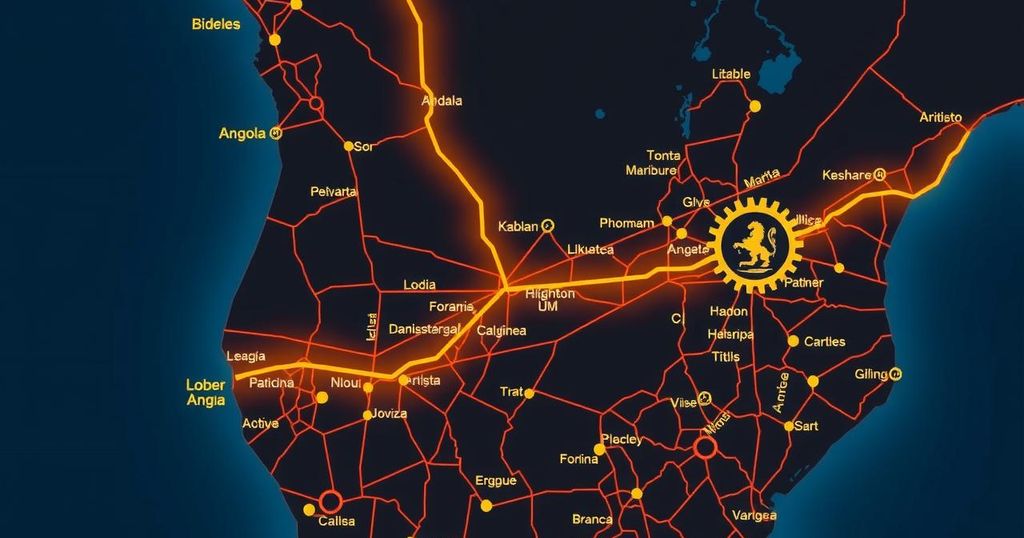Biden’s Historic Visit to Angola: A Strategic Counter to China in Africa

President Joe Biden’s upcoming visit to Angola marks a significant step in U.S.-Africa relations, emphasizing infrastructure investment as a counter to China’s influence. The Lobito Corridor project is central to this strategy, aimed at improving mineral transport from regional mines to Angolan ports, thus enhancing trade and local economies. Angola’s evolving political landscape under President Lourenço provides an opportunity for closer ties with the U.S., despite potential challenges ahead with the Trump administration.
President Joe Biden is poised to commence his inaugural visit to Africa as the sitting U.S. president, with a significant focus on Angola. This visit aims to pivot towards strengthening U.S.-Africa relations amidst concerns about future engagements following the expected presidency of Donald Trump. Angola, rich in oil and essential minerals, has become a focal point as Biden seeks to counter China’s growing influence on the continent.
Biden’s choice of Angola is pivotal as it marks the first time a sitting U.S. president has visited the nation, highlighting a thaw in relations post-2017 when President João Lourenço sought closer ties with the U.S. Following a history tied to Chinese and Russian influence, Angola’s foreign policy has transformed under Lourenço’s pragmatic approach. Analysts suggest that increasing U.S. involvement in infrastructure projects in Angola signals a strategic economic counterbalance to China’s Belt and Road Initiative.
One of the critical projects associated with Biden’s visit is the Lobito Corridor, a railway intended to connect resource-rich areas of the Democratic Republic of Congo and Zambia to the Angolan port of Lobito. This ambitious infrastructure endeavor is designed not only to transport essential minerals, like cobalt and lithium, crucial for electric vehicle batteries but also to stimulate broader trade and agricultural activities along its route. The corridor reflects an investment partnership involving multiple stakeholders, including the U.S. and other G7 nations, to the tune of $600 billion by 2027.
Angola aims to redefine its image as a viable investment destination, with Lourenço hoping that the incoming U.S. administration will sustain these development initiatives. However, the feasibility of the Lobito Corridor could be influenced by potential shifts in local export policies, favoring more refined mining processes to boost local economies. Still, the substantial copper resources in the region may ensure the project’s viability against cyclical demand fluctuations in minerals like lithium and cobalt.
The corridor’s development comes on the heels of post-civil war reconstruction in Angola, with past investments predominantly from China being re-evaluated by local authorities. Biden’s visit, fulfilling a 2022 commitment to African leaders, encapsulates a broader strategy for the U.S. to engage competitively in Africa’s infrastructure landscape while promoting a multipolar approach to international relations.
Biden’s visit to Angola is significant as it reflects a strategic shift in U.S. foreign policy towards Africa, especially in light of increasing competition with China. Since independence from Portugal in 1975, Angola has oscillated between alliances with China and Russia, shifting towards the U.S. under President Lourenço. This change indicates a desire for more balanced international partnerships, particularly with initiatives like the Lobito Corridor representing a collective investment interest aimed at enhancing trade and resource distribution across Africa and beyond.
In conclusion, President Biden’s visit to Angola is emblematic of a wider U.S. strategy to bolster its presence and influence in Africa, particularly in response to China’s dominance in the region. The developments surrounding the Lobito Corridor not only signify infrastructural growth but also reflect a commitment to enhancing trade relations, fostering development, and positioning Angola as a key player in global resource markets. As upcoming political shifts loom with the Trump administration on the horizon, the sustainability and direction of these initiatives remain a focal point for both the U.S. and Angola.
Original Source: www.bbc.com








